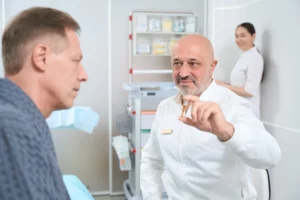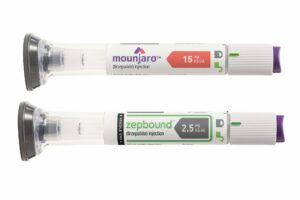What Is Testosterone?
Testosterone is a hormone found in humans and animals, and is created by both males and females. The production of testosterone increases around puberty and begins to decline after 30, by about 1% to 2% a year. Although, it is not only older people that can be affected by Low T.
How Low Testosterone Affects Men
Testosterone is produced in the testicles in men, and is an important hormone for healthy body function. It plays an important role in quite a few things, like; the production of muscle mass and the strength of bones; facial hair, pubic hair, and body hair growth; developmental aspects of the body as well as the deepening of a man’s voice; his sexual vitality, and sex drive; even such things as verbal memory and the ability to think clearly. Which is why it is unsurprising that Low testosterone levels, or Low T, can show symptoms in a variety of ways in men. Such as:
- Decreased sex drive – This includes the loss of interest in sex, as well as the loss of sex drive completely, and erectile disyfunction that can either be a complete loss of erection or a reduction in the quality of erection.
- Weight gain – if you feel like you have gained weight and lost muscle mass it could be from Low Testosterone. With that, it can also cause loss of bone density which can lead to fractures and breaks.
- Changes in mood – including depression, and even having a difficult time concentrating
- Decreased energy – While some level of fatigue is normal as we age, a regular lack of energy, and feeling lethargic, could be a sign of Low T
- Low self-esteem – Maybe you aren’t growing body hair like you used to, and you just don’t feel attractive, it could be caused by, or a side effect of the symptoms of, Low T.
Age is not the only thing that can cause low testosterone. Chemotherapy, testicular injury, kidney disease, alcoholism, and cirrhosis of the liver, among other possible reasons. Men’s normal testosterone levels can vary greatly, but usually range between 280, and 1,100 nanograms per deciliter (ng/dL) depending on the individual, medical history, and time of day.
How Low Testosterone Affects Women
It is a common belief that men are the only ones that produce and require testosterone to keep their hormones in balance, but that is not at all true. While it is true that men require higher levels of testosterone, everyone requires a certain amount and it is produced in small amounts in women’s adrenal glands and ovaries. There are similar symptoms of low testosterone in women as there are in men. These symptoms being:
- Low sex drive – A decreased desire for sex, and even a decrease in sexual satisfaction is a possible sign of Low T.
- Weakened bones strength – loss of bone density, and osteoporosis, easily fractured and broken bones.
- Poor concentration – Fatigue, sluggishness, and not sleeping well can lead to poor concentration.
- Depression – Depression can be caused by the low testosterone itself, as well as the toll the symptoms can take on your mental state.
Low testosterone can be caused, in women, by issues with pituitary, hypothalamus, or adrenal glands, menopause, or removal of ovaries. As expected, an adult female’s testosterone levels are significantly lower than men’s and generally range between 15 and 70 ng/dL.
The problems, mental and physical, caused by Low Testosterone can really affect your quality of life regardless of gender. It can change how you view yourself, and it can also make you worry about how others view you. And if the problems are serious then you have to deal with the health ramifications as well. These things can greatly impact your mental health.
What is Testosterone Replacement Therapy (TRT)
If you are feeling defeated with all of these things happening to your body there may be help for you. There is an option, Testosterone Replacement Therapy (TRT). TRT may be a viable solution for your current situation. It is exactly what it sounds like, it is a physician controlled therapy to replace the necessary testosterone hormone. Testosterone Replacement Therapy treatments methods come in different forms such as oral medications, transdermal (skin) patches, topical creams, and intramuscular injections to name a few. Some of them can be administered on a daily basis, or even twice daily, while others are on a monthly basis.
Testosterone was first discovered in 1771, by John Hunter, an English surgeon when he transplanted a rooster’s testicles into a hen. Luckily that is completely unnecessary these days because of the invention of synthesized testosterone. It was created in 1935 and has since been available for clinical use. Hormone replacement therapy (HRT) was the beginning of Testosterone Replacement Therapy, and started in the 1960’s. It is rather comforting to know what this kind of science has been around for a while, and that there have been studies done on the effects of Testosterone Replacement Therapy.
Knowing the effects that Low Testosterone has on the body, and maybe seeing these symptoms in yourself, you are probably wondering what TRT, sometimes called androgen therapy, can do for you. How can it help?
How Testosterone Replacement Therapy Can Help Men
Each person is different, and may respond differently to TRT, here are some of the possible benefits of Testosterone Replacement Therapy for men.
- Improved Muscle Mass
Testosterone and fat can create a cycle that feeds off each other. Men who are overweight are more likely to suffer from Low Testosterone, and men who suffer from Low Testosterone are more likely to be overweight. TRT can optimize testosterone levels and help to break that cycle by decreasing fat, and together with a well balanced exercise regimen, can increase muscle strength and endurance.
- Increased Bone Strength
Men with Low T tend to have bone density decline that happens in tandem with drops in testosterone levels. This leads to an increase in risk of breaks and osteoporosis over time.
- Heart Health
When a heart is healthy it pumps blood around the body and provides muscles, and organs with the oxygen they need to perform their best. Testosterone helps with red blood cell production through bone marrow, and decreased levels have been linked to risks of cardiovascular health.
- Better Memory
Studies have shown that higher testosterone levels demonstrate a link to a reduced incidence of Alzheimer’s disease development. Others have shown that having an optimal testosterone level can help with improved cognition, memory, and the rate of recall. It can even help with spatial memory, and mathematical reasoning.
- Sexual Vitality
It is a well known fact that in men testosterone is closely associated with their sex drive, and higher levels of testosterone production leads to an increased sexual desire. Low testosterone can impact their ability to achieve and maintain an erection. Optimizing testosterone levels can even improve the quality of erections.
- Improved Mood
As previously mentioned, low testosterone can affect mood, but also the symptoms of Low T can also do the same. Helping treat the symptoms and the underlying cause of Low Testosterone with TRT can help mental and emotional imbalances. It can help cure the fatigue that comes with it, but also help with cases of irritability, depression, and even anxiety.
How Testosterone Replacement Therapy Can Help Women
Women may require less testosterone to regulate that part of their hormones, but as stated, when it is low it can be just as harmful physically, and mentally. There have been studies to look at how TRT has helped women in these particular ways:
- Mood
TRT can help vastly improve problems with fatigue, irritability, and depression. Which can help improve mood, and give women more energy and boost feelings of well-being. Plus, it can help improve mood just by helping alleviate some of the more severe symptoms.
- Hearth Health
Research suggests that it can help women’s cardiovascular systems in the same way it can help with men’s.
- Sex
Testosterone Replacement Therapy can help increase women’s sex drive, help improve their sexual satisfaction, and it can even decrease the risk of vaginal atrophy. Vaginal atrophy, or atrophic vaginitis, is when the vaginal walls thin, are dry, and become inflamed. It can cause urinary issues, and make intercourse incredibly painful.
- Bone Strength
Sustaining optimal testosterone levels can help encourage healthy bone tissue growth, and help maintain it. This is particularly true for bone mineral density in the spine and hips.
- Muscle Mass
Women have less muscle mass than men, naturally. TRT can help with the maintenance of muscle mass, and even increase it. It can even help decrease the amount of fat storage in the body so it can help decrease the risk of obesity. This is particularly helpful for women who are post-menopausal because the fat storage in the body can increase during and after menopause.
There are some unfortunate things to discuss about TRT for women. The FDA has not approved Testosterone Replacement Therapy for women yet, it has only approved it for use on men. However, this does not mean that it cannot be used by women, there are a lot of drugs out there that are still prescribed and used without the FDA approval for women. If you decide to look into doing TRT, it is incredibly important that a fool-proof method of pregnancy prevention should be used during the course of your treatment. This is because of the adverse effects that testosterone can have on a growing fetus.
It is also problematic that some women find the idea of Testosterone Replacement Therapy to be too masculine to take part in, and that they would somehow be less feminine. However, if you look at the benefits of TRT, it is quite the opposite, and it can, in fact, make the women more feminine throughout the course of their treatment.
Testosterone Replacement Therapy, like everything in life, including life, can have negative side effects. These side effects include, but are not limited to, Oily skin, acne, fluid retention, shrinking testicles, decrease in sperm production. However, in the long run the effects of Low Testosterone on a person, male or female, can be debilitating mentally, and sometimes physically and must be weighed against the negatives to decide what is best for you as an individual.
If you are suffering from any of these issues and think you may be suffering from low testosterone the best thing to do is schedule an appointment with a physician and they can help you decide. This is necessary so they can ascertain if it is part of the normal aging process or if there is a larger issue that needs to be fixed. If they test the level of testosterone, they may need to do it more than once because Testosterone levels are affected by several factors such as, diet, fitness level, medications, and even the time of day the test is performed. There are some great options available to get you the help you need. If you are embarrassed, or don’t have the time to do an in person consultation try an online consultation.
Men and women are fundamentally different biologically, and treatment with TRT must be approached with care and consideration. Correct formulas and dosages need to be factored while also considering the medical history of the patient, by the physician. Make sure that provider you choose is qualified, and HIPAA compliant. From there, they can help you plan the best course of action for your situation, because no two cases are the same and you should feel confident in the discretion of your chosen provider.












